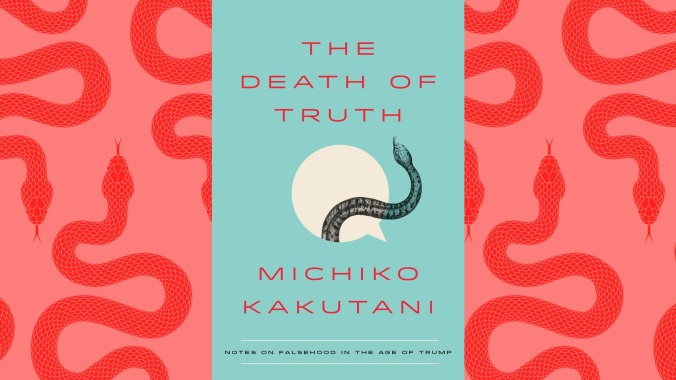Legendary critic Michiko Kakutani reviews all the president’s lies in The Death Of Truth
Aux Features Book Review
If the role of the critic is to “educate the public,” as Oscar Wilde once wrote, Michiko Kakutani couldn’t have picked a worse time to retire from her post as chief book critic of The New York Times last July. Sure, serving for three decades as arguably the most important gatekeeper in literary publishing warrants a break. A whole calendar of deadline-less weeks must have sounded divine. A buyout beckoned. There are books to write, still more books to read and reread, maybe even, as they say, for fun!
But couldn’t Kakutani, who will likely be remembered as one of history’s most essential, beloved, feared, and reviled cultural critics, have waited another three years? Couldn’t this immensely private writer, who famously never uses the first-person pronoun in her work, yet whose name often pops up as public fodder—she’s the only Pulitzer Prize winner name-dropped on Sex And The City, The O.C., and Girls—have helped us through 2020, when the more reasonable among us might once again welcome a president who privileges empathy over narcissism, unification over demagoguery, democracy over totalitarianism, and, perhaps above all else, the joy of reading books.
Thankfully, Kakutani hasn’t completely relinquished her critic’s post. In The Death Of Truth: Notes On Falsehood In The Age Of Trump, she takes a brief but potent dive into our era’s decline of reason, distortion of reality, prevalence of disinformation, and the vile little man fomenting much of it all. It’s a book delivered with a built-in audience, one hungering for the kakistocracy that is the Trump presidency to get Kakutanied with the same intellectual rigor and ruthless humor she once administered to Norman Mailer, John Updike, Jonathan Franzen, and Bill Clinton, among many others.
The belief that ignorance is now fashionable lies at the heart of Kakutani’s book. The banality of truth defines the present moment. Conservatives once embraced red-baiting; “alt-righters” now get high on red-pilling. Alarmingly, Kakutani writes, the “roots of falsehood” originate from the same novelistic and postmodernist playbooks that she, alongside the academic and intellectual circles loathed by the right, uphold as culturally and politically vital. Like the French deconstructionists before them, American conservatives treat language, science, and narrative as unstable forms. Rereading these goons here makes Donald Rumsfeld’s bullshit farrago from two presidencies past—“known knowns,” “known unknowns,” “unknown unknowns”—sound like Derrida. Newt Gingrich to CNN anchor Alisyn Camerota on the subject of FBI crime data: “The current view is that liberals have a whole set of statistics which theoretically may be right, but it’s not where human beings are… As a political candidate, I’ll go with how people feel and I’ll let you go with the theoreticians.” Rush Limbaugh on science: “Scientists wear white lab coats and they look really official [but] they’re frauds. They’re bought and paid for by the left.” Trump on fascist protestors and counter-protesters: “But you also had people that were very fine people on both sides.”
For those who haven’t read every article, essay, and book about the current presidential regime, Kakutani breaks it down, all in fewer than 175 pages: Trump’s 5.9 lies, on average, per day. Websites for government agencies like the Environmental Protection Agency plainly announcing that they would be “updating language to reflect the approach of new leadership.” Trump’s commemorative presidential coins replacing “E pluribus unum” (out of many, one) with “Make America Great Again.”
Throughout, the author digs deep into her literary reference bag of tricks to diagnose our nation’s many ills. The president, she writes, in a sentence that’s pure Kakutani, resembles a “mashup of Ubu Roi, Triumph the Insult Comic Dog, and a character discarded by Molière.” The national mood is compared to “the indigenous American berserk,” after Philip Roth. T.S. Eliot gives voice to “this twittering world” of internet-addled junkies, “distracted from distraction by distraction.” The imaginary world made real at the center of Jorge Luis Borges’ short story “Tlön, Uqbar, Orbis Tertius” becomes the MAGA, Russia, Bowling Green trifecta that defines Trump’s post-truth presidency.
But for all it offers, The Death Of Truth can’t help but feel a bit skimpy, a rush job riding the wave of anti-Trump books. Enjoy your retirement, but please don’t abandon us, Kakutani. We need the critic as much as we need books.